Subtly in the vein of Dogville or Coetzee's Disgrace, and invoking the works of Agota Kristof, Un Amor probes ideas of language, alienation, and community through the eyes of a woman who, when brought into conflict, finds herself on the potential brink of deeper awareness of herself and her place in the world.
On the heels of a cryptic mistake, Nat arrives in La Escapa, an arid rural village in Spain's interior. She settles into a small, shabby house with cheap rent to begin work on her first literary translation, with a skittish and ill-tempered dog--a gift from the boorish landlord--her only company.
Burdened with assumptions about country life, Nat will enter into relationships with the handful of local inhabitants--her negligent landlord, Píter the hippie, the dementia-afflicted Roberta, the young city family who comes on weekends, the unsociable man they call "The German"--from whom she appears to receive a customary welcome.
Mutual misunderstanding and a persistent sense of alienation, however, thrum below the surface. And when conflicts arise over repairs to the house, Nat receives an offer and makes a crucial decision.
In prose as taut and oppressive as the atmosphere in La Escapa, Un Amor extends Mesa's exploration of language and power, confronting readers with the limits of their own morality as tensions mount and the community's most unexpected impulses emerge.
On the heels of a cryptic mistake, Nat arrives in La Escapa, an arid rural village in Spain's interior. She settles into a small, shabby house with cheap rent to begin work on her first literary translation, with a skittish and ill-tempered dog--a gift from the boorish landlord--her only company.
Burdened with assumptions about country life, Nat will enter into relationships with the handful of local inhabitants--her negligent landlord, Píter the hippie, the dementia-afflicted Roberta, the young city family who comes on weekends, the unsociable man they call "The German"--from whom she appears to receive a customary welcome.
Mutual misunderstanding and a persistent sense of alienation, however, thrum below the surface. And when conflicts arise over repairs to the house, Nat receives an offer and makes a crucial decision.
In prose as taut and oppressive as the atmosphere in La Escapa, Un Amor extends Mesa's exploration of language and power, confronting readers with the limits of their own morality as tensions mount and the community's most unexpected impulses emerge.




